
From Ukraine peace plans to Kazakh uranium—all that and more in our new nuclear digest
Our November Nuclear Digest by Bellona’s Environmental Transparency Center is out now. Here’s a quick taste of just three nuclear issues arising in U...
News

Publish date: November 17, 2014
News
SADOVAYA PRISON COLONY, Sadovaya, Russia – The potbellied guards, tinted sepia by the dark cabbage field mud and grey, pissing fog crack silvertoothed grins and wipe their filthy hands on soiled sweatshirts to raise the road barrier unsteadily bolted to a stucco shack.
Somewhere inside, a transistor radio issues epileptic dance music from a station in Tambov, the region’s capitol – a strobe light Morse code message from some frantic culture beyond that underpins this dull metal horizon.
“The roamer,” they laugh when I tell them who I am coming to see, a reference to one of a slew of absurd charges that railroaded Yevgeny Vitishko – a geologist and outspoken ecological critic of the ruin carved along the Black Sea coast by the Sochi 2014 Winter Olympics – into a three-year sentence in this woebegone prison work farm.
The roamer moniker describes his alleged jumping of probation and suspended sentence conditions that were levied against him and his colleague at the Environmental Watch on the North Caucasus (EWNC), Suren Gazaryan, in 2011 for allegedly spray painting a private construction fence tossed up in a public forest in Sochi National Park. The fence surrounded Kremlin ally and notoriously unforgiving Krasnodar Regional governor Alexander Tkackev’s lavish summer home, but the forest is public and the fence prevented beach access.
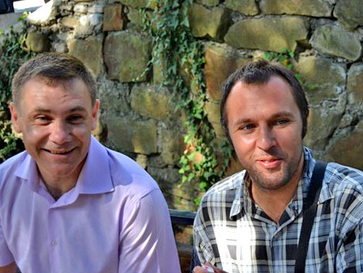
Dozens of witnesses have told Bellona Yevgeny and Gazaryan had no part in defacing the fence with the simple words “This is our forest.” Even more bizarrely, forestry officials in the Krasnodar Region have told Bellona in an official letter that they have no evidence the fence even exists.
During the Olympics last February Yevgeny petitioned to have the conditions of the suspended sentence dropped. In response, the government threw him in prison.
Yevgeny’s failed bid during the Olympics last February to have the conditions of the suspended sentence for the so-called “fence incident” dropped led, instead, to him actually being thrown in prison.
That’s why he now lives at the KP-2, or Sadovaya, settlement colony, a 12 hour train ride from Moscow to the village of Kirsanov, followed by a three hour car ride and a stiff two hour walk across windy birch-dappled flats when the roads finally become impassible to vehicles.
It’s a minimum security camp. Prisoners in civilian garb wandering the muddy, boot-sucking road between the guard post and the main barracks are almost indistinguishable from the relatives and friends bringing them supplies and coming for visits.
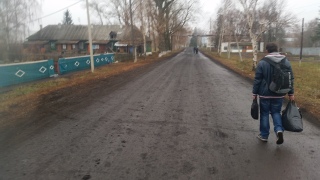
It’s not quite Solzhenitsyn’s Gulag Archipelago – but the pilings of Stalin’s paranoia meat grinder are still visible.
Small shacks line the prison road, and their yards, scattered with smatterings of pale dirt-caked cast-off toys, or clotheslines that are hopeless against the hoarfrost and rain of the region’s early winter, house the families of the guards that work at the camp. The lack of cars suggests they, too, are as cloistered as the inmates.
Past the houses, on the left, the top of the prison colony’s barracks rise above a wooden fence wisped with razor wire. Its ochre topple-brick Stalin-era baroque architecture was built by other prisoners in 1938, at the height of the purges. In this building, in a giant hall for 800 prisoners, Yevgeny has a cot and a footlocker.
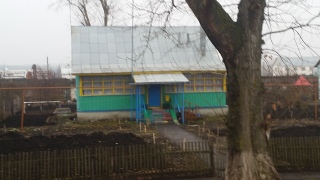
The inmates’ days center around illogical, mind numbing routine. In the spring and summer, prisoners work the farm that grows cabbage and beets. As fall and winter close in, the sweatshop work retools with sewing machines for police uniforms, sheet metal production, and making garish souvenirs for junk tourist shops. So, if you’re making a last-minute purchase of a matryoshka doll at the Moscow airport gate before boarding your flight for JFK, there’s a chance Yevgeny made it.
The first frosts slow the prison colony’s hollow heartbeat, which thumps on, unchangeable, geared toward petty humiliations, repetition, anesthesia, the erasure of memory, that combine in an effort to form perfect Putin-age drones.
Anthem to requiem
The daily singing of the national anthem “is perhaps one of the more startling disconnections I feel,” says Yevgeny, “as well as a sense of loss.”
He is not in any sense nostalgic for the Soviet era, but the Soviet national anthem and the new Russian national anthem, which are almost identical but for a few changes in the lyrics, offer for Yevgeny a contrast between a hope for collective good, and a monument to selfish rapacity.
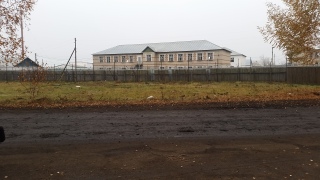
“The old anthem was about belonging to something bigger than ourselves – even if that something turned out to be abhorrent,” Yevgeny tells Bellona in his first interview since he was sent to the prison colony. “All the same, you could think as a schoolchild that this is the song of a country that put the first person in space, and that it did it together, an anthem that inspired us to think beyond ourselves and beyond conventional borders.”
“Now,” he continues, “we are nothing but a country of divisions, and individual pursuits of wealth and gaudy status symbols meant to show how much better one thief is than another.”
It’s a perfect song for a place where, recently, Yevgeny said, his shoe laces were stolen and no one would loan him a new pair so he could avoid being written up in the daily disciplinary report.
“Go out for yourself, steal for yourself, do for yourself,” he says. “That’s what the new national anthem means.
Jailed for ‘something’ but what can be a mystery
Most of those stuck behind the walls and gates are there on nickel-and-dime first time raps any half sober lawyer could have beaten.
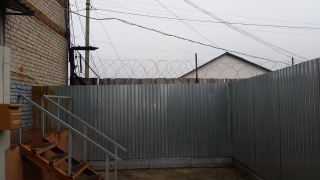
“They’re here because they did something,” Yevgeny says. “But whether that something warrants prison isn’t always clear.”
Inmates’ charges get outed by the banal nicknames the guards hurl around: “Needles.” “Sticky Fingers.” “Wallet.” “Baker.” The baker is a warped fence post of a guy from Abkhazia, Krasnodar’s neighboring republic, who stole bread; Needles is anyone up on a drug charge; Sticky fingers, theft. And so on. The lackluster sobriquets doled out by the bored overseers are not hard to decipher but supply some small amusement. Prison time is slow time, even for the guards.
Still others are there because they were simply in the wrong place at the wrong time, says Yevgeny: Someone had a grudge to hone, a judge a quota to fill, a cop had a beef because someone gave him lip, a prosecutor had no real suspects but needed to send someone, anyone, up the river – or in this case down to the farm. A venal bureaucrat had to stand in front of another bureaucrat who reports to another bureaucrat about cleaning up crime.
“It happens all the time in Russia,” Yevgeny tells me. “Russian jurisprudence – or, let me correct that – the system is totally unpredictable, and this,” he says, motioning to buckling water stains on the visitor cell’s ceiling and its barred windows, “could happen to anyone.”
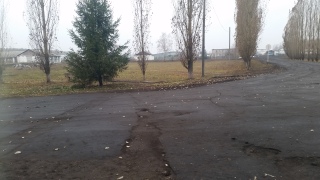
And good luck if the case goes to court.
“The cops grab someone, and they don’t give a damn if the person is innocent or not – they just need to close a case, fast” he says. “And if the case comes to court, there’s a nearly 100 percent chance it will result in a guilty verdict. It works like a machine.”
The statistics bear it out. Pretrial bail in Russia is so rare it’s barely discussed, and conviction statistics have hovered at about 98.9 percent for decades, according to Prosecutor General’s figures – making Russia’s state attorneys and police look like some of the slickest law enforcement officers the world has every seen.
One or many political prisoners?
Yevgeny is the colony’s only political prisoner in the classic sense of the phrase. Any review of his case – and there have been hundreds by dozens of domestic and international rights groups – shows he was jailed time and again by zealous prosecutors driven under lash across sketchy legal terrain by Tkachev, an enormous booster of the Olympics, on the most feather-light of trumped up offenses.
Vitishko’s prosecutors even filed their own appeal for his freedom in September, fearing the case’s irregularities and outright legal violations would eventually backfire in their faces.
As for “roaming?” Yevgeny had missed a total of two meetings with his parole officer, which, the parole officer later testified, were rescheduled and attended by the defendant.
The fence incident slammed him with de facto house arrest for two years for spray painting two faint Russian words, making one wonder at the penalties faced by Russia’s emergent movement of urban hip-hop graffiti artists who spray murals on anything that doesn’t move.
PG-13 language barriers
And then, in February, he was jailed on a 15-day administrative sentence in his hometown of Tuapse, 70 kilometers northwest along the Black Sea coast from Sochi, for swearing in public.

Independent lawyers not connected to Yevgeny’s case told Bellona there aren’t really any statutes for that on the books unless you are really looking for them – and a walk down any Russian street on any given day will be accompanied by the music of the language’s particular brand of creative profanity.
But the administrative incarceration ensured Yevgeny was not present in the Krasnodar courtroom for his appeal, but was instead viewing proceedings via a snowy closed circuit TV from the Tuapse jailhouse on February 12 when his suspended sentence became real jail time.
Amnesty International named him a Prisoner of Conscience.
But he seems ill at ease with the distinction. In his view, nearly everyone sharing his barracks is the victim of a politically motivated attack.
“Whether you stole a car or food to eat, there is no due process, no opportunity for you to tell your side of the story, no defense” he said. “The prosecutors write the decisions for the judges, or the judges are told what to decide by someone higher up,” he says. He would know: The Krasnodar court decision to blast him with a custodial sentence was reached after less than two minutes of deliberation by the judge.
“The system is one of complete stagnation that hasn’t changed since it was conceived by Stalin,” he says. “Once you’re here you are transported back in time and stripped of all your rights: how then are we not all somehow political prisoners?” Most everyone here slipped through some crack that shouldn’t have been there.
Getting to jail
In Russia, there’s no such thing as traveling light. People shuttle back and forth across the country with enormous suitcases wrapped in cellophane by airport personnel, or on trains, laden with enormous plastic zipper bags and grocery sacks filled with parcels friends and relatives send each other via familial courier systems – heavy jars of homemade pickled mushrooms and jams, piles of backdated newspapers and magazines, delicately embroidered garments, letters not to be trusted to the antiquated postal system.
When arriving at your destination, you seek revitalization, usually unsuccessfully, from the discomfort of the journey and make of yourself a lopsided Christmas tree, hanging straps and fraying handles from both arms and every articulation they offer – shoulders, the crooks of your elbows, each finger good for bearing the seeming tonnage of yet another bag.
And thus, you join the throng of your half sleepwalking, cussing fellow passengers on the train platform, bouncing off one another like nine-pins with your unwieldy loads.
When Dmitry Gutov, a friend of mine from EWNC, and I arrive at Kirsanov station in the Tambov region, we are similarly burdened by packages for Yevgeny – clothes from well wishers, books I have brought from the US to embolden his study of English, independent newspapers like Novaya Gazeta, more journal notebooks that he fills with vivid recounting of his prison life – and a pore-deep mist of noxious, foot-smelling sweat from our 12 hour overnight journey from Moscow on a seriously overheated train.
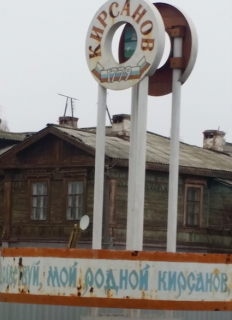
After wiping ourselves somewhat cleaner with a pack of baby wipes we purchased, we have another 40 kilometers to go and some shrewd bargaining to do with the smoky cabal of taxi drivers gathered in front of the station.
Our first destination at the Sadovaya colony, past the first guard post, past the guard’s shacks, and around the back of the barracks is the visitors’ intake center. Its operation hours are staggered, though prisoners at Sadovaya have the right to see friends and relatives between 9 am and 6pm.
By noon, we are running late for the procedures in front of us to make a two-hour visit with Yevgeny. The first is clearing my American passport with prison colony officials.
The camps are, after all, a closed slice of Russia society that the state has sought to keep a lid on to the point of exiling and executing those who document it.
The window
In the nervous moments Dmitry and I spend waiting for the small, recessed plywood window whose white paint is greased over by generations of hands knocking for someone to open it, I am hoping the authorities will opt, in my case, for exile.
Someone finally opens the window and takes the passports without a word.
The visitor’s reception is predictably dingy, consisting of a dim and naked overhead light bulb screwed into a ceiling socket, and four folding chairs against a wall whose faded flower wallpaper curls floor-ward in ragged, uneven strips. The linoleum buckles and bubbles. One can smoke outside under a canopy of razor wire. I feel the place closing in on me.
To distract myself, I read the notices pinned to one side of the boarded window. One is a cautionary tale: A certain A I Martinov had on October 29 attempted to pass to his imprisoned brother E. I. Martinov, a burner cell phone inside a pack of Petr I cigarettes. A. I. Martinov received a week’s solitary confinement and his brother a 3000 ruble ($64) fine. That seemed unfair, and as I finish reading, I hope A will eventually exact some brotherly revenge on E.
Another notice lists the prisoners’ breakfast, lunch and dinner fare. Yet another directs visitors to the prison cafeteria, which Dmitry’s reconnaissance discovers is a total bargain of astonishingly delicious vegetables, stews and meats at laughably low prices.
Along side that hangs portrait of a cannonball-headed man with epaulets on his shoulders. Colonel Gavrilov, reads the description, the deputy warden of the colony to whom I’ve often spoken on the phone over his penchant for tossing Yevgeny into solitary for allegedly hiding food in his barracks locker and furnishing reports via telephone on rampant beatings by guards of prisoners.
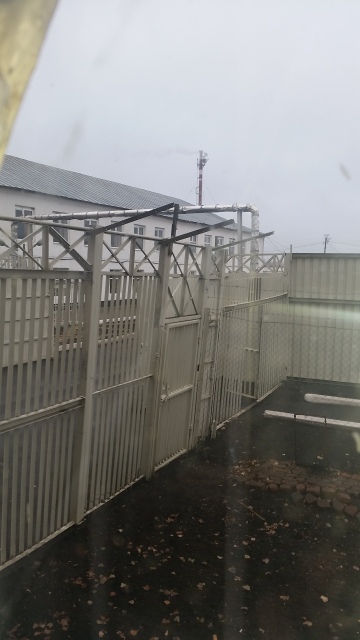
Gavrilov, whose porcine cheeks and double chin are squeezed into his military collar looks, like a man who enjoys his work.
The window finally opens again and on the other side is a blond female guard. Her name is Olga; she is wearing a uniform that was pressed that morning, and looks to be about 30. Her politeness in this place comes as a shock. She tells me that my citizenship poses no restrictions on visitations. Still, our passports – the proof and essence of any person’s existence in Russia – will remain in her hands for the duration of our stay.
Olga then hands us several blank sheets of Xerox paper on which fill out two “protocols”; one each for Dmitry and me stating the purpose of our visit, the other an itemized listing and description and intention of each article we have brought to be passed to Yevgeny.
The list is tedious to compile. A fleece overshirt –to keep warm. A wind breaker – against foul weather. Several pairs of trousers. For the sake of common decency? Blank writing journals. To record the prisoner’s thoughts and impressions? The further the list goes, the more uncertain we feel in our explanations as we are forced to stray further and further from the obvious intentions behind each item’s use: basic human need. We knock, wait, knock again, wait, and when the board opens, pass the lists through.
Then we wait again.
The visitation cell
Finally, Olga fetches us with no warning. We’ve waited hours since submitting the protocols, and I’m blowing smoke rings into the barbed wire as Dmitry treks back from the cafeteria with what we expect will be our dinner. Immediately, we are told to abandon our possessions and follow her.
As she leads us across a dirty courtyard to the main barracks, she recites the rules: No touching, no phones, no recording devices, paper, cameras or pens. I touch the notebook shoved down the back of my jeans with apprehension, and notice a group of prisoners dragging in the last frostbitten and anemic cabbage harvest. Others are coming from the workshop where they stamp out prefabricated particleboard furniture for dour, soulless Soviet offices like the one Olga must work in.
The lights have not been turned on yet when we reach the cavernous arched mouth of the barracks, and its teeth of bars slam shut behind us. We’re now in the hands of actual prison guards – the ones that beat up Yevgeny and others and tossed him in the hole. I’m not feeling a lot of trust for the fatigue-clad guys with side arms roughly guiding us by our elbows in the faded light through one slamming cage to another. There’s none of the buzzing in and out. It’s all done with huge, jangling keys.
With a final slam, we emerge in dimly lighted room with a wide table. Yevgeny is sitting in the far corner.
In Russia, fighting for ecology is fighting for human rights
My arrival to him is a surprise – our mutual friends at EWNC had not told him I was coming. His smile makes up for the lack of light and we immediately move toward one another to embrace just as a guard solidly sideswipes me with the deftness of a hockey goalie.
Guards remain during our conversation, rotating frequently to either disguise boredom or report on what is said, or both, and constantly tramp in their jackboot across the hard floor to answer the loud and unexplained dial-faced telephone positioned in the cell.
Here I must disclose that I was more keen on simply seeing Yevgeny than asking him any of the routine reporterly questions about prison life. Ever since we first met in January in Tuapse, when he was still a free man, our discussion of his environmental battle easily flowed through the night into a walk along the town’s piers and a wry discussion of our kids, two rakehell boys who are the same age. We became fast friends.
The grind of nine months in prison on a three year stretch doesn’t’ seem to have worn him down. He is still the same springy, athletic, quick-witted switch of a man I met on the Black Sea coast and his presence in the stuffy barred room infuses it with memories of free sea air.
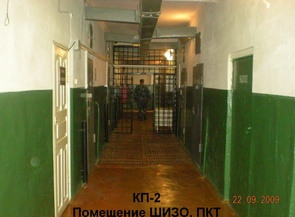
The beatings he has thus far suffered, his stints in solitary, his previous alienation from other prisoners, who the guards turned against him, was not reflected in his face, which seemed actually more youthful than at our initial meeting 10 months before. The rough treatment, he said, had, after all, led to the installation of more telephones in his barracks, where some 80 prisoners had been vying for the use of one.
Ever one to right wrongs, Yevgeny had embarked on a campaign to establish that prison colonies of this type must maintain a certain prisoner to telephone ratio, and he would go on hunger-strikes, write letters and legal briefs, and suffer the brunt of truncheons until the phones were installed.
But his reams of journals, one of which he carries with him all the times, present a record of existential reflection and self education he’s been engaged in since he was first trucked away from Tuapse to the Gulag.
He’s, for instance, written a philosophical treatise on logic. He has since turned his back on it, though, because “the temptation to become a cynic in prison is too strong, so it’s impossible to write objective, rational philosophy here – prison is no place for that, no place for serious thought.”
But he says he’s noting a new shift in his thinking about environmental issues and human rights issues and how, in Russia, especially, these issues become one in the same – and that this turn of thought has been sparked by the Russian penal system itself.
“We end up in these jails, inside these walls because of our optimism,” he says, reflecting on the fact that his initial resistance to Olympic construction and revealing corruption and shoddy ecological science was based on a sense that he could improve things.
“But nothing, absolutely nothing in our government is working in this sense, they could not care less,” he says. “Then perhaps it ends up in court, and where it goes from there no one knows, but it’s never anywhere good.”
In that sense, says Yevgeny, “there may not be any justice to be found, but there has to be fairness somewhere, I believe that, so, by those means, because I’m searching for fairness, I’m therefore engaged in the struggle for human rights.”
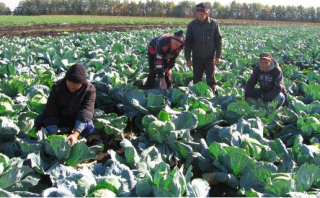
Yevgeny says that winding up in jail for him was just part of the process – either it wasn’t going to happen or it was, and when the government decided it needed an example, someone to shut up in a public way, he was a perfect fit.
In our initial meeting, he told me he was not afraid to go to jail if it meant that it would become a bellwether for the cause. If it drew international attention to the rape of the North Caucasus Mountains, where he had previously studied rocks, while his friend Gazaryan explored for bats, then he was ready to take it for the team.
But Yevgeny is a little less certain about what the team consists of anymore. Gazaryan fled the country, and now Yevgeny is the star prisoner for Russia’s environmental movement.
“Now I am a good example on an international level,” he says, “and they can point and say look at what happens to free thinkers in Russia.”
“I know life will be okay when I get out,” he continues, “but I don’t want to be a star, I’d like to go back to my old life and study rocks. I’m not sure that will be possible.”
It’s a lot to think about, he says, and perhaps he doesn’t have to take it up all at once. But its as good a way as any to pass the time. “And I’ve got plenty of it – after all, what is geology in its simplest terms but the study of slow, almost imperceptible shifts?”
A few days after I have seen Vitishko, I find myself on a square in front of Krasnoyarsk’s opera house surrounded by hundreds of drunken cops. It is the celebration of a national holiday, the Day of Employees of the Organs of Internal Affairs – the nationwide toast to the police.
Their glassy red eyes are following a montage running across an enormous plasma screen at one end of the square. The scenes flashing across it are of incredible brutality: burly, camouflaged officers of the OMON, Russia’s swat team, pummeling what appear to my untrained eye as innocent buy-standers first to their knees and then to the ground. A special cheer goes up as the bloodied face of a young woman is shoved by her hair into the camera’s lens, and she is then thrown down onto an icy street, cuffed and hurled into the back of a waiting paddy wagon.
If anything has changed in Russia since Yevgeny’s arrest, it is certainly imperceptible.

Our November Nuclear Digest by Bellona’s Environmental Transparency Center is out now. Here’s a quick taste of just three nuclear issues arising in U...

For three years now, Bellona has continued its work in exile from Vilnius, sustaining and expanding its analysis despite war, repression, and the collapse of international cooperation with Russia in the environmental and nuclear fields

The Board of the Bellona Foundation has appointed former Minister of Climate and the Environment Sveinung Rotevatn as Managing Director of Bellona No...

Økokrim, Norway’s authority for investigating and prosecuting economic and environmental crime, has imposed a record fine on Equinor following a comp...